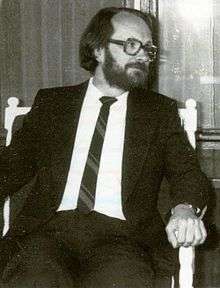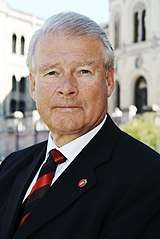1981 Norwegian parliamentary election
Parliamentary elections were held in Norway on 13 and 14 September 1981.[1] The Labour Party remained the largest party in the Storting, winning 66 of the 155 seats. The Conservative Party made the strongest gains and formed a government on its own. In 1983 a majority coalition government with the Christian People's Party and the Centre Party was established.
| |||||||||||||||||||||||||||||||||||||||||||||||||||||||||||||||||||||||||||||||||||||||||||||||||
All 155 seats in the Norwegian Parliament 78 seats were needed for a majority | |||||||||||||||||||||||||||||||||||||||||||||||||||||||||||||||||||||||||||||||||||||||||||||||||
|---|---|---|---|---|---|---|---|---|---|---|---|---|---|---|---|---|---|---|---|---|---|---|---|---|---|---|---|---|---|---|---|---|---|---|---|---|---|---|---|---|---|---|---|---|---|---|---|---|---|---|---|---|---|---|---|---|---|---|---|---|---|---|---|---|---|---|---|---|---|---|---|---|---|---|---|---|---|---|---|---|---|---|---|---|---|---|---|---|---|---|---|---|---|---|---|---|---|
| |||||||||||||||||||||||||||||||||||||||||||||||||||||||||||||||||||||||||||||||||||||||||||||||||
| |||||||||||||||||||||||||||||||||||||||||||||||||||||||||||||||||||||||||||||||||||||||||||||||||
Results
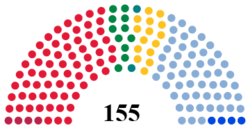 | ||||
|---|---|---|---|---|
| Party | Votes | % | Seats | +/– |
| Labour Party | 914,749 | 37.2 | 66 | –10 |
| Conservative Party | 780,372 | 31.7 | 53 | +12 |
| Christian People's Party | 219,179 | 8.9 | 15 | –7 |
| Socialist Left Party | 121,561 | 4.9 | 4 | +2 |
| Progress Party | 109,564 | 4.5 | 4 | +4 |
| Centre Party | 103,753 | 4.2 | 11 | –1 |
| Non-socialist joint lists | 88,969 | 3.6 | [a] | – |
| Liberal Party | 79,064 | 3.2 | 2 | 0 |
| Red Electoral Alliance | 17,844 | 0.7 | 0 | 0 |
| Liberal People's Party | 13,344 | 0.5 | 0 | 0 |
| Communist Party | 6,673 | 0.3 | 0 | 0 |
| Plebiscite Party | 1,145 | 0.0 | 0 | New |
| Tom A. Schanke's Party | 826 | 0.0 | 0 | New |
| Freely Elected Representatives | 801 | 0.0 | 0 | 0 |
| Lapp People's List | 594 | 0.0 | 0 | 0 |
| Broad-Based Non-Partisan List | 383 | 0.0 | 0 | New |
| Invalid/blank votes | 3,387 | – | – | – |
| Total | 2,462,142 | 100 | 155 | 0 |
| Registered voters/turnout | 3,003,093 | 82.0 | – | – |
| Source: Nohlen & Stöver | ||||
a Five seats were won by joint lists, all of which were taken by the Centre Party.[2]
gollark: Light of Witching.
gollark: At least one.
gollark: Probably.
gollark: Looks like I'll have all my slots free at some point on Halloween.
gollark: YES! My reds are back!
References
- Dieter Nohlen & Philip Stöver (2010) Elections in Europe: A data handbook, p1438 ISBN 978-3-8329-5609-7
- Nohlen & Stöver, p1460
This article is issued from Wikipedia. The text is licensed under Creative Commons - Attribution - Sharealike. Additional terms may apply for the media files.
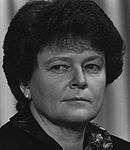
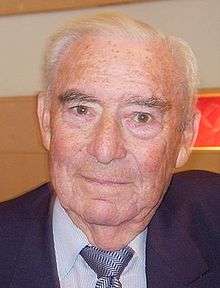
.jpg)
